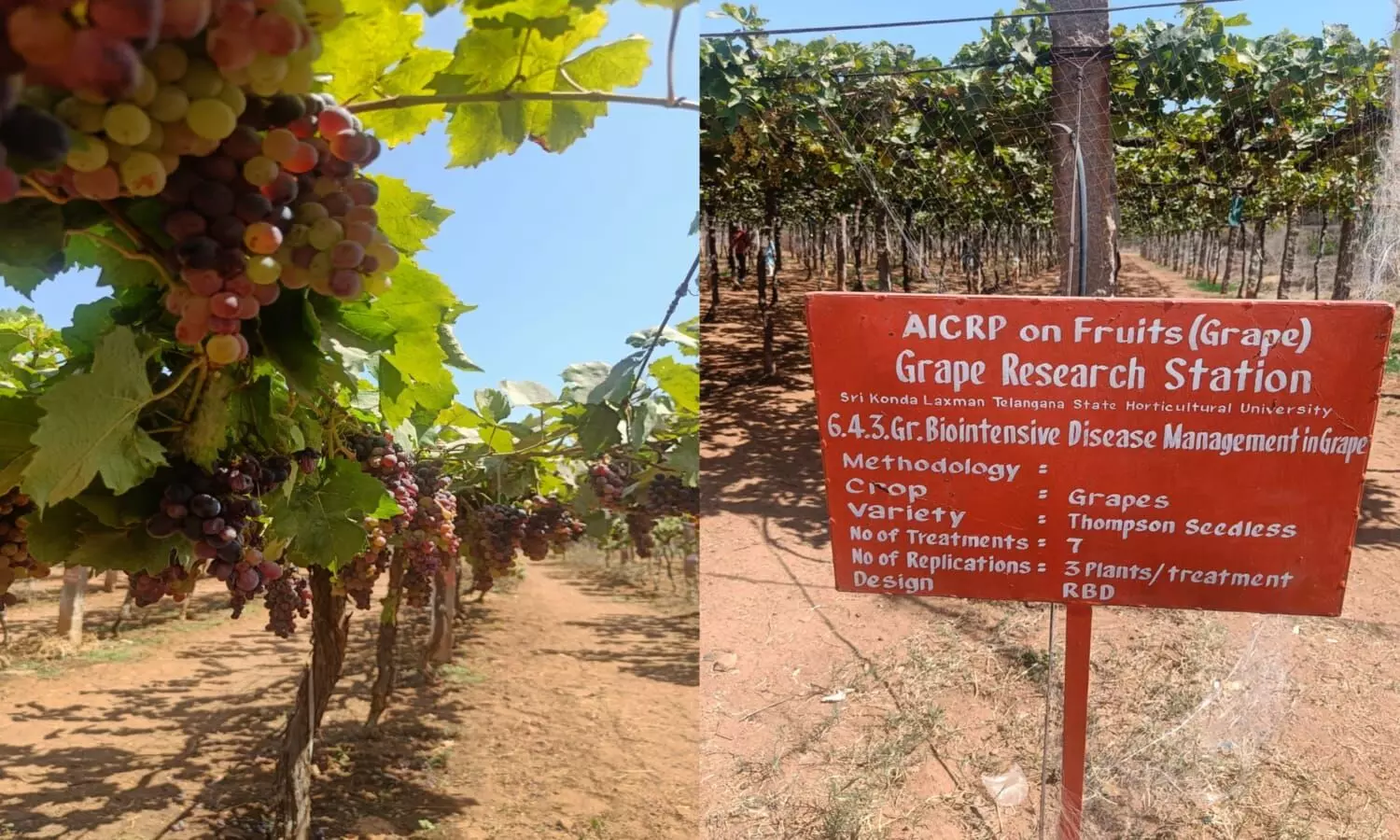Hyderabad Grape Festival: Pluck, taste, buy until last bunch at Grape Research Station in Rajendranagar
Festival enthralls visitors with its diverse array of grape varieties, spanning from the golden Thompson Seedless to the deep black Sharad Seedless and the rich amber-hued Anab-e-Shahi

HYDERABAD: The enticing aroma of fresh grapes filled the air as the annual Grape Festival opened at the Grape Research Station in Rajendranagar, Hyderabad, on February 12. Welcoming visitors of all ages, this year's festival promises an immersive experience in the world of grape growing and flavor exploration.
Spread over 3.5 acres of organic gardens, the Grape Research Station offers an impressive array of 62 grape varieties for visitors to pick, taste and buy. The Grape Festival enthralls visitors with its diverse array of grape varieties, spanning from the golden Thompson Seedless to the deep black Sharad Seedless and the rich amber-hued Anab-e-Shahi.

Upon entering the grape station, visitors are handed a blade to pluck grapes to their heart's content. With no entry fee, families and children alike can roam the vineyards, sampling grapes straight from the source. Prices for the freshly plucked grapes range up to Rs 300 per kilogram. The Grape Festival in Hyderabad continues until every grape is picked from the grape station.
Beyond the tasting and plucking experience, the Grape Festival serves as a platform for showcasing the groundbreaking work of the Grape Research Station. From developing new grape varieties to pioneering agro techniques, the station's scientists at the grape station are dedicated to advancing the field of viticulture.

Visitors can delve into the nuances of grape cultivation, learn about the latest varieties developed by the Grape Research Centre, and understand the strides being made towards sustainable farming practices.
At the Grape Festival in Hyderabad, visitors not only get to taste and purchase freshly plucked grapes but also get a glimpse into the cutting-edge research and advancements happening in grape cultivation in Telangana.

"Visiting Hyderabad's grape festival was an absolute delight. We spent a wonderful day wandering through the vineyards, hand-picking organic grapes with the kids. We not only learned about the scientific research behind grape cultivation but also sampled varieties of delicious grapes and purchased plants," said D. Prasad, a visitor.
The Grape Research Station in Rajendranagar stands as the sole facility dedicated to grape research in the entire state of Telangana. From evaluating grape varieties, hybrids, and rootstocks to developing sustainable agricultural techniques and minimising pesticide use for pest and disease management, the station plays a crucial role in advancing grape cultivation practices by conducting scientific research across various fronts.
Moreover, the station extends its expertise to student researchers and collaborates with national and multinational companies through paid trials, fostering a fruitful public-private partnership. Equipped with state-of-the-art facilities for plant, soil, and water analysis, as well as raisin making, the Grape Research Station serves as a hub for innovation and excellence in the field of viticulture in Telangana.

The Grape Research Station diligently examines the performance of diverse grape varieties and hybrids within the local agro-climatic conditions. Beyond mere assessment, the station evaluates these grapes for their utility in various forms: as table grapes, for raisin production, and for juice extraction purposes.
Moreover, a key focus lies in developing cost-effective agricultural techniques conducive to high-quality grape cultivation. This involves thorough evaluations of rootstocks to ascertain their compatibility with commercially viable grape varieties and their ability to withstand both environmental and biological stresses. Through rigorous screening processes, the station identifies grape varieties and hybrids resilient to pests and diseases, thus contributing to the advancement of sustainable grape cultivation practices.

The Grape Research Station also conducts assessments of novel chemical molecules aimed at effectively managing significant pests and diseases affecting grape cultivation. Beyond research, the station plays a pivotal role in providing guidance to farmers on best practices in grape cultivation.
History of Grape Research Station in Hyderabad
Hyderabad boasts a rich history in viticulture, earning its reputation as a prominent grape center in India. In 1969, the city achieved a remarkable feat, setting a world record in grape production with an astonishing yield of 42 tons of Anab-e-Shahi per acre. Renowned viticulture scientist Dr. H.P. Olmo hailed this achievement as a biological wonder, underscoring Hyderabad's significance in grape cultivation.
The story of Anab-e-Shahi, a popular grape variety, traces back to its introduction by Abdul Baquer Khan from the Middle East around 1890. Its name, meaning "grape" and "royal," was bestowed by the Nizam of Hyderabad in 1943. The late Shankarpillay, a horticulturist during the Nizam era, played a pivotal role in commercially cultivating Anab-e-Shahi from the 1960s onwards, marking the beginning of commercial viticulture in the region.
In 1956, the responsibility for grape research was entrusted to the Agriculture Department of Andhra Pradesh. With the establishment of Andhra Pradesh Agricultural University in 1965-66, the Grape Research Station was transferred to the university's purview. Presently, the Grape Research Station, now part of Sri Konda Laxman Telangana State Horticultural University, has been actively involved in fruit improvement programs since 1975, under the All India Co-ordinated Fruit Improvement Programme (AICRP).
Located in the Southern Telangana Agro climatic region, the station continues its legacy of grape research.



